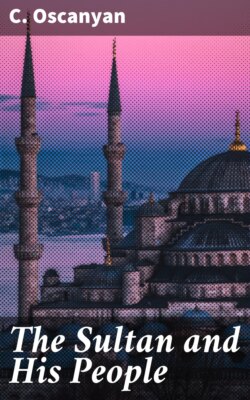Читать книгу The Sultan and His People - C. Oscanyan - Страница 6
На сайте Литреса книга снята с продажи.
HOWLING DERVISHES.
ОглавлениеTable of Contents
There is an intoxication in the very motions of the whirling dervishes, but the horrible ceremonies of the Rifayees are really distressing to the beholder.
A long, empty hall, much like that of the Inquisition, as its walls are adorned by an infinite variety of instruments of torture, constitutes their temple of worship.
The fanatical disciples of this sect assemble every Thursday at their Tekké, which is in Scutari, and after the performance of the usual ritual of the Mussulmans, commence their ceremonies by ranging themselves along the three sides of the apartment and within the balustrade, which serves to separate them from the spectators.
Their sheikh takes his stand before the Mihrab facing the assembly, and three or four of the members furnishing themselves with instruments of music place themselves in the centre of the hall.
The performance then begins, by a monotonous chant, accompanied with music, and the waving of their heads to and fro, which seems to create a sympathetic vertigo in the Mussulman bystanders—for they often are irresistibly drawn into the ranks.
By degrees, the motion increases, the chant grows louder, and their countenances become livid, and their lungs seem to expand with the noise and excitement.
The line becomes a solid phalanx as they place their arms on each other’s shoulders, and withdrawing a step, suddenly advance with a tremendous and savage yell, Allah—Allah—Allah—hoo! which divine appellative is to be repeated a thousand times uninterruptedly.
This strenuous effort renders them perfectly hideous, their very eyes seem ready to start from their sockets, and their lips foam as the inspiration possesses them. Thus retreating and springing forward, they, each time, with increasing energy, renew their invocations of Allah, Allah, Allah, hoo! until the distinctness of their articulation is lost, and their exclamation becomes, in reality a complete howl, as if proceeding from a pack of enraged dogs—thus meriting the sobriquet of the “Howling Dervishes.”
The movements and cries increase in swiftness until a mist of dust pervades the dim apartment, and the wild and pale enthusiasts, drenched with perspiration, seem like fantastic demons in the realms of discord. Suddenly some of them, stripped to their waists, rush forward and seizing the poignards and stilettoes, commence a wild, infuriated dance, jumping, leaping, and lacerating themselves—fixing the weapons into the hollow of their cheeks, and twisting them round and round, as if on pivots, until, exhausted from exertion, they fall to the ground in a spasmodic fit.
“Only to show with how small pain,
The sores of faith are cured again,”
Now the enthusiastic mothers approach, and cast their children before the presiding sheikh, who, as they lie extended before him, deliberately plants his heavy feet upon their frail bodies, and so stands for some seconds. Old men and maidens, lay themselves low before this saint, who is supposed to be by this time so inspired as to have a miraculous power of expressing all ailments and maladies from the human frame, and to have become so etherealized by the ecstatic ceremonies as to lose all his specific gravity.
The Abdals include the various classes of the stoics, who generally pretend to a total renunciation of all worldly comforts. Sometimes clothed in the coarsest garments, and again half naked, and even with lacerated bodies, they wander through the Mohammedan dominions, a miserable set of frantic, idle, and conceited beggars. They may, in fact, be considered the “communists” of the East, who despising honest pursuits, live upon the community at large.
They commit the worst extravagances under the pretence of heavenly raptures, and are even supposed to be divinely inspired. Idiots and fools are esteemed by the Mohammedans as the favorites of Heaven; their spirits are supposed to have deserted their earthly tenements, and to be holding converse with angels, while their bodies still wander about the earth.
It would be wearisome to go into further details; for infinite is the diversity of the orthodox theologies of the Mohammedans, with the 235 articles of the creed, on which all the doctors of divinity differ; hopeless must be the task of the student to surmount the commentaries of the 280 canonical authors, not to mention the innumerable heretical tenets of other sects, which must be studied to be controverted.
Verily we would suggest the recipe of a certain Molla, who must have given up in dire despair, “Whenever you meet with an infidel, abuse him with all your might, and no one will doubt you are a staunch believer.”
As long as war and its exciting scenes occupied the restless minds of the Arabs, there was no time for religious or party intrigue. The simple “La Illah-Illallah,” satisfied the momentary breathings of their souls heavenward.
The turmoil of their life, the glitter of their arms and dreadful carnage of all infidels, sufficed to ease their fancy, and satisfy the thirst for excitement.
It was as they wiped their blood-stained scimitars, and during the reaction which comparative peace and luxury created, that their minds, free from more substantial food and activity, sought greater refinement of spirituality.
In the absence of the real, the speculative began to grow, until Imams and Ulema found that they could turn the tide of human affairs to their own advantage, by exciting polemical and theological controversies.
A comparative study of the niceties of Mussulman doctrine, and hair-breadth distinctions with those of more refined and enlightened creeds, while it displays many and striking similarities, only illustrates, with startling vividness, the time worn maxim, that “there is nothing new under the sun.”
